Who decides when kids start school? Some NC districts are in open revolt
The height of the pandemic brought a change education leaders wanted — and needed.
For the 2020-21 school year, the North Carolina General Assembly approved a one-year relaxation of the state’s school calendar law and allowed traditional public school districts to start earlier in August. It was intended to give students time to make up for learning lost during the early months of COVID.
What lawmakers didn’t know: it opened the door for revolt.
“They let us start school early. Why? Because it was in the best interest of the kids,” said Charles Jeter, a former legislator and the executive director of government affairs for Charlotte-Mecklenburg Schools, the second largest district in the state. “The tourism industry didn’t fight it because we couldn’t go on vacation in 2020-21. They let us taste the medicine. It got us hooked that this was a good idea. We all hopped on board.”
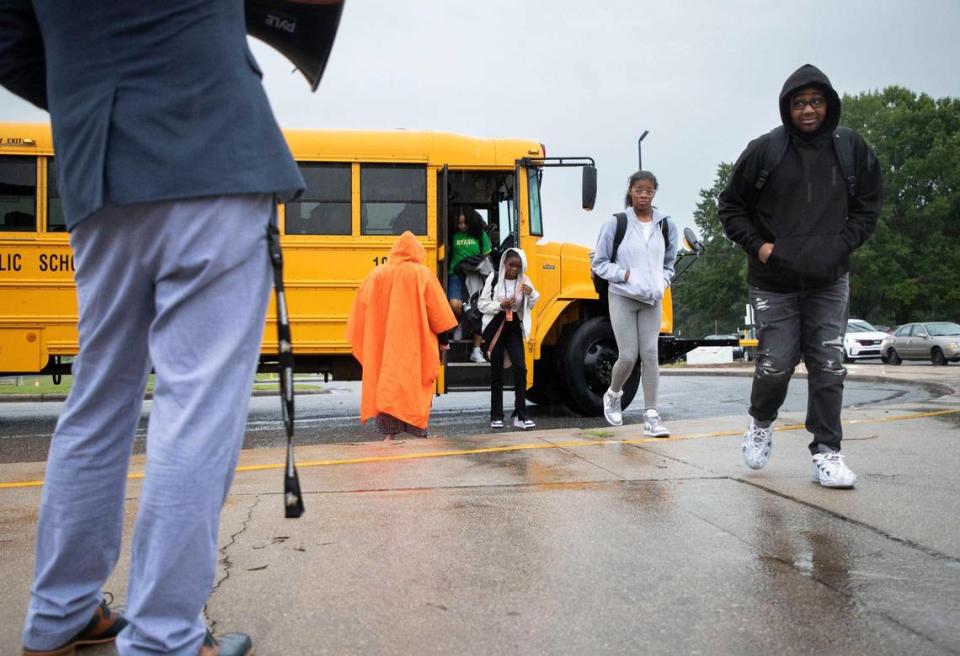
Then, Jeter says, “they shoved everything back.”
The nearly 20-year-old law establishes opening and closing dates for the state’s traditional public schools, preventing them from opening sooner than the Monday closest to Aug. 26 or closing later than the Friday closest to June 11. But public school districts across North Carolina continue to recover from the academic fallout the pandemic produced — state test scores are the lowest they’ve been in two decades — and education leaders believe the state’s calendar law isn’t helping.
It’s damaging student performance, school leaders contend. Districts want the first semester to end in December so students can take mid-year exams before the winter break, says Todd Hagans, the chief communications officer for Gaston County Schools. Districts also want the return from winter break in January to mark the start of the second semester.
So, Gaston County Schools and 15 other districts are intentionally breaking the law this year. Gaston County begins the 2023-24 school year Wednesday.
“The start date for school has to be earlier,” Hagans told The Charlotte Observer. “The Board of Education adopted a school calendar that aligns with what parents, students, teachers, and others prefer.”
Districts are taking a stand partially because only one district has been threatened with punishment for breaking the law. For others, there have been no consequences.
“Those districts said, ‘Screw it, we’re going to do what’s best for our kids,’” Jeter said. “Nothing happened.”
A law built for NC tourism

It was the dead of summer — July 18, 2004. The time was 3:02 a.m.
North Carolina’s lawmakers were approving House Bill 1464 after a summer of debate. The bill included edicts on the number of teacher workdays, teacher salary payments and declaring Veterans Day as a school holiday.
Most notably, the bill established opening and closing dates for the state’s traditional public schools. A parent group helped organize support because, as one parent told the News & Observer at the time, “We’re sick of our family time disintegrating before our eyes.”
The real estate and tourism industries jumped on the bandwagon, too. The late Senate leader Marc Basnight, a Democrat from Manteo, said then he voted for the bill, in part, because early August starts limited the money “poor teenagers can make from summer jobs.”
Lawmakers, many of whom said they hadn’t seen an issue so charged since the Equal Rights Amendment, passed it though the Senate after midnight by a count of 25-5 and the House on a vote of 59-37.
The state’s tourism industry claimed then and now the change is a boon for business. But it’s an annual reminder that state law limits school districts’ flexibility.
Legislators of all affiliations from across North Carolina for years have tried to change the law without success. They regularly introduce bills to change rules for their own districts. And they team up to make broader changes. This year, a bipartisan bill that would allow local school boards across North Carolina to choose when the school year starts moved to the Senate, where it’s stalled.
Senate leader Phil Berger, an Eden Republican, told the Observer “at this point, the Senate position is that the calendar law is the calendar law. And the Senate is not interested in doing one-offs, which is, in many respects, what we’ve seen from the House. So I don’t know that there’s anything that is going to change as far as that’s concerned.”
Berger also says, “It’s workable for the school systems.”
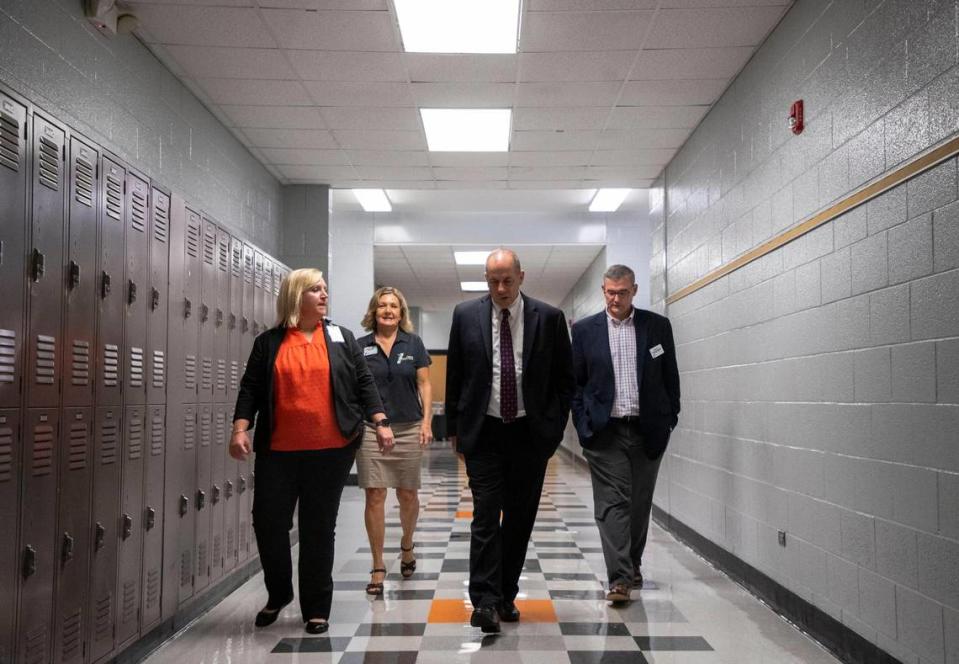
Districts disagree. Their best case against the law: more than 1.4 million students in traditional public schools cannot take their exams until after they return from their two-week winter break unless they cut the first semester short. It’s a reality that makes it harder for students and teachers to “refresh and reset,” says Charlotte public school teacher Leslie Neilsen.
Of the school districts who are breaking the law, only one — Union County — tried and failed to make the change because of a lawsuit by a pair of parents. The school system backtracked before the suit had its day in court.
Andrew Houlihan, the superintendent of Union County Public Schools, expressed his frustration on July 31 in a post on the social media platform X, formerly known as Twitter. He wrote: “In a couple of weeks, the majority of districts in the SW region of NC will start school. 1st semester HS exams before winter break: (check). End the school year before Memorial Day: (check). @UCPSNC will begin weeks later on 8/28. Hard to explain: YEP!”
In a couple of weeks, the majority of districts in the SW region of NC will start school. 1st semester HS exams before winter break: . End the school year before Memorial Day: . @UCPSNC will begin weeks later on 8/28. Hard to explain: YEP! #TeamUCPS pic.twitter.com/cYrXu7wC4o
— Andrew G. Houlihan (@AGHoulihan) July 31, 2023
Changing the law won’t be beneficial for the state or tourism, the second-largest industry in North Carolina, said Brian Lewis, a veteran lobbyist at the North Carolina General Assembly. He lobbies for the N.C. Travel Industry Association, among others.
”We’re trying to preserve the status quo,” Lewis said. “I spend a lot of time talking to the leadership about why preserving the school calendar law is beneficial to our state, not only the jobs it creates but the robust economy it creates.”
Lobbying with donations
School districts don’t have lobbyists in the same way as the tourism industry. And the influence of lobbyists has been clear from the law’s early days.
Larry Lancaster, then a member of the Cumberland County Board of Education and a former N.C. School Boards Association president, wrote in a July 2004 letter to the editor to the News & Observer that the real estate industry pressured legislators to “vote against local control.” Lancaster said the N.C. Association of Realtors was a big contributor to legislators and supported the measure — things still true today.
NC Realtors, a nonprofit trade association of 57,000 real estate professionals, sees the law as critical for a “successful summer vacation system,” and makes donations through an associated political action committee of thousands of dollars to legislators. Other school calendar-friendly groups contribute thousands to legislators, too.
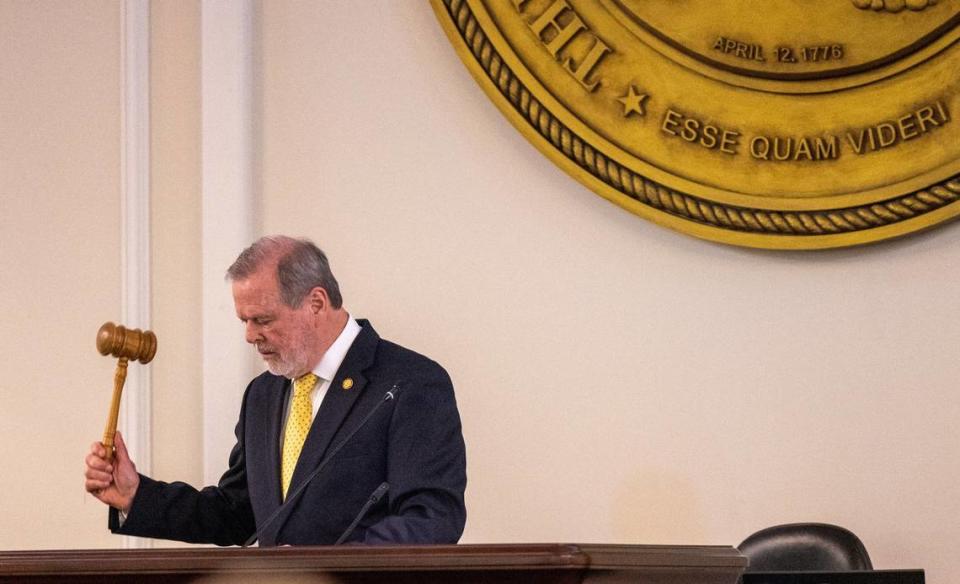
Leading the chamber where calendar bills stop, Berger has received $32,400 from the NC Realtors PAC for his campaigns since 2017 and $30,000 from the NC Restaurant and Lodging Association PAC.
Sen. Todd Johnson, a Republican from Union County, received more than $14,000 from the NC Realtors and NC Restaurant and Lodging Association PACs during the 2022 election cycle. Johnson, who did not return requests for comment, also received $3,000 from the political arm of the law firm that sued Union County Public Schools before the system reversed course.
It’s not just majority party lawmakers who receive donations from the groups. Democrats do, too. Among them: Senate Democratic Leader Dan Blue of Raleigh, who’s received several thousand dollars in donations from the NC Realtors and NC Restaurant and Lodging Association PACs during the same period. So has House Democratic Leader Robert Reives of Chatham County. Neither Blue nor Reives were in the legislature in 2004 to vote on the calendar law bill.
Chris Marsicano, a Davidson College professor whose research has focused on education-focused lobbyists, says he’s skeptical money buys influence.
“Money buys a second look or maybe attention,” Marsicano said. “The only way money affects policy decision is if someone does not have an opinion on something. Many lawmakers don’t have a position on the school calendar. Is it possible the tourism industry is buying off politicians? It’s possible. But it’s more likely that the politicians care about the tourism industry because it benefits all of us.”
What about the tourism industry?
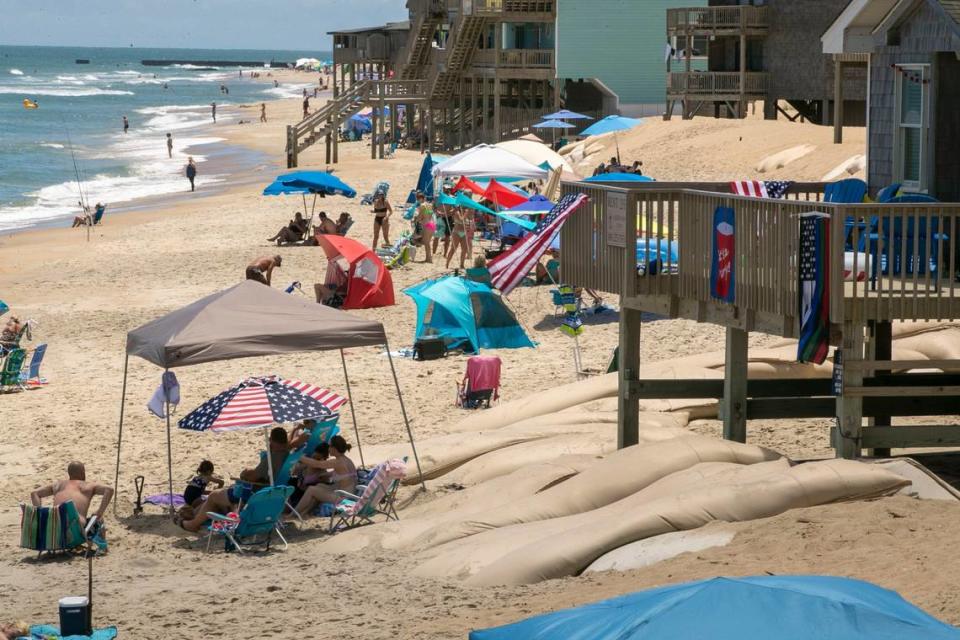
Lewis said his lobbying is specifically focused on stopping school systems from “taking away” the state’s third-biggest month for tourism — August.
“When the summer calendar law was passed in 2004, we were knocking on the door of being a $14 billion tourism industry. This past year, we posted numbers from 2022 that has N.C. at over $30 billion,” said Lewis, who hosts the Do Politics Better podcast with Skye David, also of the New Frame lobbying firm. “We’ve doubled. Can I say that’s because of the calendar law? No. But I do know this: lawmakers from the mountains and the coast aren’t going to let local school systems encroach and kill their local summer business.”
Data isn’t readily available to directly show the impact of the calendar law on the state’s tourism economy. Neither Vince Chelena, executive director of the North Carolina Travel Industry Association, nor Lynn Minges, the president and CEO of the North Carolina Restaurant and Lodging Association, could provide estimates.
Jeter offered an example at Carolina Beach as a practical effect. School districts want to end earlier and start earlier. So, it’s just a matter of how much vacation rentals cost in different months, he said.
“The difference in rental price for an entire week between the first week in June and the second week in August is a grand total of $97,” Jeter said. “For a daily revenue of $13.86 in tourism dollars, we are willing to put more than a million students at a competitive disadvantage to other students within our own state and those out of state?”
Chelena counters by asking how much exactly are school districts OK with losing in tax revenue. Chelena and Lewis both cite cooler weather in June as a reason why it’s less attractive for vacations.
Different school schedules across the state also could eat into the size of the workforce that makes North Carolina’s summer tourism economy run, Chelena and Minges said.
“(The current law) is important to the travel industry as we continue to struggle with staffing issues because it affords students a full 10-week summer work experience,” Minges said. “The current school calendar provides flexibility to allow local school boards to end the fall semester before the holiday break which educators have indicated is important.”
But it would cause an imbalance in the length of each semester. If schools ended the first semester before winter break, the semester would end up with about 73 instructional days. The second semester would then have about 104 instructional days.
“It’s technically possible to have exams before winter break. It’s also possible I could run a marathon without training,” Jeter said. “Any reasonable person would argue neither is advisable or a good idea.”
What about the students?
For school districts, it’s about much more than tourism tax revenue.
For Heather Koons, of nonprofit Public Schools First NC, it’s about allowing local leaders to make decisions because they “know best what calendar will work for their students and families.”
Cabarrus County Schools spokesman Philip Furr told the Observer the school board unanimously voted to start school on Aug. 10 this year to put students in the best position possible to recover from learning losses following the pandemic. The calendar law makes it easy for districts to break — there no penalties.
Statewide data released in 2022 showed math students in North Carolina middle and high schools were more than a year behind where they should be because of damage wrought by the pandemic. Student losses in reading were anywhere between two and seven months. And learning losses deepened from 2018 to 2021 in grades three through high school, according to data from the state’s Office of Learning Recovery and Acceleration. Those losses were in reading, English and math.
While districts have boosted summer programs and tutoring, among other interventions, school leaders believe tweaking school calendars so students can take exams and end the semester before winter break can aid in the recovery process.
Students don’t tend to study during the two-week break, teachers say.
Like many counties across North Carolina, the earlier start also benefits Cabarrus County students who are enrolled in both community college courses and traditional high school courses, a practice that has grown dramatically over the past several years. With an earlier start, community college and traditional high school courses and exam dates line up.
A way around state law?
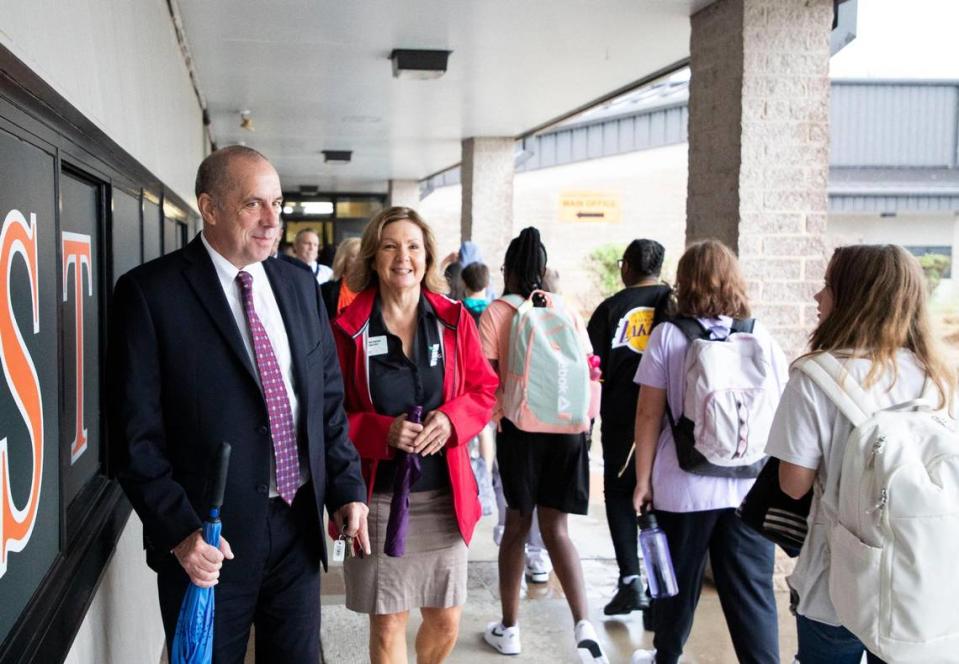
In 2019, the districts that started early found a loophole that involved year-round schools, which are exempt from the mandate. At the time, the law didn’t define “year round,” so officials from several districts that started early claimed their optional summer school programs qualified.
But that same year, lawmakers modified the law to change the definition of a year-round school to close the loophole, Jeter says. Now some lawmakers are pushing for consequences for those districts who break the calendar law.
While about a dozen school districts have waivers, the following districts are breaking the law for 2023-24 according to the state: Avery County, Cabarrus County, Cleveland County, Elkin City, Gaston County, Henderson County, Iredell-Statesville, Jackson County, Kannapolis City, Lee County, Lincoln County, Mount Airy City, Polk County, Rutherford County, Stanly County and Surry County.
“The local systems that are ignoring state law are setting a really bad example for students,” Berger said. “And if there is some sort of compromise, I’m not aware of what that would be.”
CMS says it won’t violate the law, but it’s not particularly fond of it, either.
“CMS has never voted to approve anything that would violate North Carolina laws. I simply can’t imagine we ever would in the future,” Stephanie Sneed, the school board’s vice-chair, told the Observer. “However, as we’ve advocated for the past 12 years, CMS strongly believes that the state’s calendar law needs to change… and needs to change now. I’ll never understand how we continue to put the tourism industry’s concerns over that of our children.”
Sen. Michael Lee is a Republican who represents New Hanover County, including Wilmington and Cape Fear Coast beaches. Lee sponsored Senate Bill 499 this year. The bill would allow more people within a county to sue the school district for breaking the law.
The bill has been stuck in the Senate’s education committee since April. Lee did not respond to a request for comment.
“Districts are saying yes, we know it’s against the law, but lawmakers didn’t include penalties in the law,” said Chelena, of the North Carolina Travel Industry Association. “So districts are saying, ‘What’s to keep us from breaking the law?’ It’s a horrible message.”
House vs. Senate: Why a bill won’t move

Marsicano, the Davidson College professor, says “civil disobedience” may be exactly what N.C. needs to change the law. The count is at 16 districts now. It’ll take 20 or 30 districts out of the 115 in the state, Marsicano thinks, to force a change.
“It’ll force lawsuits and force the state to do something about the law itself — put teeth in it or change the law for flexibility,” he said. “When it comes down to it, if it’s going to cost legislators, then expect some movement.”
In the meantime, the debate remains N.C. House vs. Senate because Republicans have supermajorities in both chambers of the General Assembly. It’s a trend that’s become common since the GOP won control in 2010. Though when they had simple majorities, they needed some Democrats to vote with them, or Democratic Gov. Roy Cooper to allow a bill to become law.
If an issue is important enough to one chamber, they’ll use it as a negotiating tool, and the school calendar bill hasn’t risen to that level.
House Speaker Tim Moore voted against the “save our summers” school calendar law bill 20 years ago, and it’s his chamber that repeatedly passes legislation to change it today. But he’s come to a realization: The Senate has made it clear it will not take up school calendar bills coming from the House.
“At a certain point, you just realize it is what it is, and you move on,” Moore said in late July.
Moore said that with some school districts flouting the law and not being stopped, the issue is “taking care of itself in some ways.”
Gov. Cooper told the Observer he believes school districts should have more flexibility to do what they need to ensure students get a “great education.” But in May he also called tourism a “vital economic force” when he announced the North Carolina tourism economy reached its highest level ever with travelers spending more than $33.3 billion on trips to and within the state in 2022.
“I would be glad to review any legislation that the General Assembly would send to me on (calendar flexibility),“ Cooper said.
For now, lobbyist Lewis is keeping his pro-calendar law flag planted in the Senate.
“We tell senators, don’t hear these bills,” Lewis said. “We know you’re getting a lot of pressure. Stop these bills from moving.”

